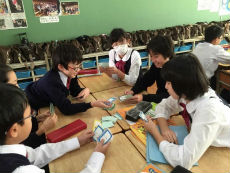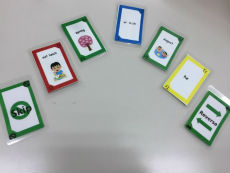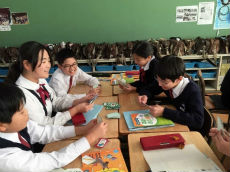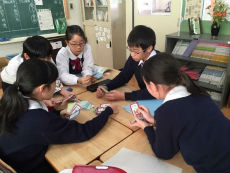小学校6年生の授業より

The main focus of our lessons has been on developing the ability to communicate meaningful information which centers around the learner’s identity – such as likes and dislikes, talents and hobbies, and his or her daily schedule.
First semester lessons included intensive pair work and occasional presentations before the entire class. Because of its importance in language learning repetition was plentiful. But personalizing the material in a way that will draw upon the students’ growing awareness of their individuality - the most effective way to increase communication at this age – is how we want to build on what we have studied thus far.
As one way of minimizing anxiety, hesitation and the fear of making mistakes we recently introduced a competitive but cooperative activity based on UNO, a card game already familiar to all of the students. The particular adaptation of the game we came up with provides, in a relaxed setting, groups of five or six students with prompts for an activity that incorporates reading, speaking and listening. It allows students to review and consolidate previously learned material. It takes the learner from controlled practice to free practice. It will also help teachers check students’ readiness for an assessment of the most recent unit of study (present simple with expressions of time to describe one’s daily routine).
Initially, student production was somewhat limited. But in successive rounds of the game students could be seen helping and challenging each other. Multiple opportunities and attempts at production, in a competitive but light-hearted atmosphere, gradually produced lengthier utterances, greater fluency and increased confidence. Another advantage of a recursive, reflective activity like this is the impetus it eventually provides for students to engage in self-monitoring and self-correction.
This type of lesson, with an emphasis on cooperation and mutual encouragement, represents the continuation of an approach started in last year’s grade five classes, but incorporates more opportunities for students to also mentor one another as they mature and as they progress in their study.
6年生の授業では、児童にとって身近なテーマを通して、意味のある文脈で英語を話せるようになることを目標としています。例えば、好きなことや嫌いなこと、得意なことや趣味、一日の予定などです。
1学期は、授業の前半に毎回、ペアワークや簡単なプレゼンテーションを行いました。言語学習において、繰り返して練習することは大切だからです。しかし、6年生にもなると、周りの目も気になり出します。この年頃の子どもたちが英語でコミュニケーションをたくさんとるために最も有効な方法は、私たちがかつて学んできた方法で築き上げることではないかと考えました。




児童が間違うことへの恐れや恥ずかしさを最小限にして英語を学習する手段として、最近、UNOのようなカードゲームを独自に開発しました。子どもたちは既に遊び方を知っており、また、競争するだけでなく協力しなければゲームが進まないというのが特徴です。5~6人が1組となり、リラックスした雰囲気の中、ゲームは進みます。カードを出す時に必ず、書いてある英語を言わなければならないので、読むこと、話すことが求められます。他のメンバーも、友だちの言う英語を聞かなければならないので、聞く力も培われます。このゲームをすることで、6年生では、児童が習った英語を復習し、より確かな力へとつなげていくことができます。また、教師に「言いなさい。」と言われて強制的に練習しているのとは違い、子どもたちの方から主体的に練習しているという状況を生み出すことができます。また、私たちも、ゲームの様子を見ることで、子どもの理解度を把握することもできます。
児童が自分で英語の表現を創り出すという点では限りがありますが、このゲームを何度もしているうちに、友だち同士で協力し、助け合っている姿を見ることが出来、嬉しく思いました。このような暖かい雰囲気の中、英語を話す機会を増やすことで、児童は次第により長く、スラスラと英語を話すようになり、自信へと繋げることができます。もう1つの利点として、このような活動を続けていく中で、子どもたちはセルフモニタリング(自分で自分の状態を観察する)し、間違っても、自分で修正する力をつけることもできます。
このように、協力し、助け合って学ぶことを大切にした授業を通して、去年から学んできたことにもさらに磨きがかかってきました。児童たち自身ができるようになったという実感を得やすく、自信につながるからだと考えます。
(2017/12/5 小学校教諭 ジェームス・バーンズ)
